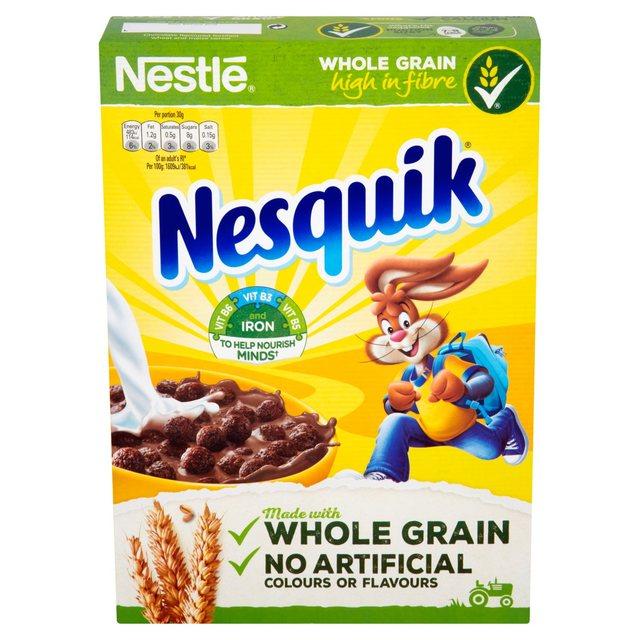In this review, I am going to analyze the ingredients of breakfast cereals made by the company Nestlé and titled Nesquik Cereal. Breakfast cereals are one of the most common types of processed food.

The serving size is 30g per portion (the company also advises to serve these 30g with 125ml of semi-skimmed milk). The ingredients include cereal grains (whole grain wheat 44.5%) (per 120g: 87.1g carbohydrates, 2.2g fats, 16.4g protein). According to FNS, if the word “whole” is placed before the first ingredient, it is more likely that the product is whole-grain. Maize Semolina (100g: 4g fats, 77g carbs, 8g protein) is made from purified wheat middlings and is considered a healthy product. Rice flour (127g carbs, 2g fats, 9g protein) is made from ground rice; it is a natural product. All these components are used to make the cereals (Nesquik Cereal, n.d.).
Sugar (100 g: 0g fats, 100g carbs, 0g protein) is added to make the product sweeter. Glucose syrup (100g: 0g fats, 78g cabs, 1g protein) apparently has the same aim. Coca powder (6.1%) (7.5 oz: 20g fats, 120 g carbs, 40g protein) adds the taste/scent of chocolate. Palm oil (1 tbsp: no fats, carbs, protein) is used as a substitute for other types of oil because it is cheaper than those; its use is highly widespread, especially in supermarket products.
Fat-reduced cocoa powder (0.5%) (6g: 4g fats, 40g carbs, 7g protein) is used to defeat chocolate products and adds a strong chocolate taste/scent (Nesquik Cereal, n.d.). Salt (1 tsp: no fats, carbs, protein) is mostly used in all breakfast cereals. Trisodium phosphate is used to adjust acidity and approved by FDA; it is not dangerous. Flavoring’s type (3 oz: 7g fats, 1g carbs, 6g protein) is not specified but is used to add a specific flavor typical for Nestlé’s cereals (chocolate/vanilla).
There is also a variety of vitamins and minerals used. Niacin (B3) (14mg per 100g) is crucial for normal body functioning; adults should take 14mg or 16mg of this vitamin each day. Pantothenic acid (B5) (5.2mg per 100g) helps the body utilize carbohydrates and proteins; adults should take 5gm per day. Vitamin B6 (1.3mg per 100g) is needed to ensure the normal development of the human brain, skin, nerves, etc.; adults should take approx. 1.3g per day. Riboflavin (B2) (1.3mg per 100g) is required for a normal function of blood cells, the skin, immune system, etc.; adults normally take approx. 1g or 1.3g of the vitamin per day (Nesquik Cereal, n.d.). Thiamin (B1) (0.97mg per 100g) regulates the body’s ability to utilize carbohydrates; adults should take approx. 12.mg or 1.1mg of it per day.
Folic acid (180mcg per 100g) plays a major role in the body’s ability to create genetic material; adults take 400mcg per day. Vitamin D (3.0mcg per 100g) regulates calcium and phosphorus and is essential for maintaining the normal bone fracture; 15mcg per day is recommended for adults (Nesquik Cereal, n.d.). Calcium carbonate (478mg per 100g) can be used as a calcium supplement and is crucial for the normal bone fracture and function; the adult dose is approx. 500mg per day (should not be used for a long period of time).
Iron (11mg per 100g) regulates the delivery of oxygen by red blood cells; 8mg per day is recommended for adults. The label also notifies the customer that peanuts, nuts, and milk can be included. This information can be perceived differently: Nestle does not use these products in significant amounts, or the company warns people with allergies that the product can be dangerous to them.
As can be seen, the cereals do not use any hazardous ingredients and provide a variety of vitamins. I believe that they still should not be eaten every day for breakfast since most of their ingredients contain fats and sugar, which can be harmful to the body. Nevertheless, the overall review has shown that the cereals are suitable for adult consumption.

Reference
Nesquik Cereal. (n.d.). Nestle Nesquik cereal 375g. Web.